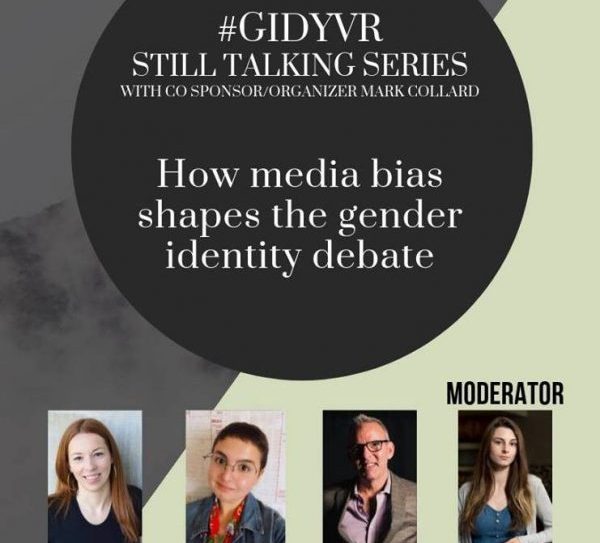By: Gurpreet Kambo, News Editor
An event being held at SFU’s Vancouver campus has caused controversy among the LGBTQ2+ community and allies. The event, titled “How Media Bias Shapes the Gender Identity Debate,” has raised concerns due to some speakers’ associations with transphobic discourse.
One of the speakers in particular, SFU alumna and founder of the website Feminist Current Meghan Murphy, has been notorious for her recent involvement in several controversial events. Murphy advocates for a gender essentialist point of view that sees gender as inflexible and determined by the genitalia that one is born with — a view that would deny the existence of trans and gender divergent individuals. She was also banned from Twitter for the use of transphobic language.
In July 2019, Murphy spoke at a sold out event at the Vancouver Public Library while protesters marched outside. VPL was subsequently banned from attending Vancouver Pride, deeming the event to be “Transphobic hate speech.”
Other speakers include similarly controversial speakers such as: National Post columnist Jon Kay, SFU alumna Lindsay Shepherd, and journalist at The Post-Millennial Anna Slatz. The event is organized by SFU professor of archaeology Mark Collard.
Many social media users spoke out against the event and SFU for hosting it. June Scudeler, assistant professor in the First Nations Studies and Gender, Sexuality, and Women’s Studies (GSWS) departments, tweeted: “Hey, @SFU, the eventbrite page for the transphobic event is still up. This is not the ‘engaged university’ I want to work at.”
Another user @lardandsabia tweeted “Hurts to know @SFU will host a GIDYVR panel. Gender identity is NOT a debate, but MM [Meghan Murphy] continues to spread transphobic hate speech under this thin veil. SFU, you’re willing to ignore BC Human Rights Code and make your trans community members question their safety to host this? #SFU.”
The event was taken down from Instagram, though the Facebook page remains up.
Following the eruption of controversy, SFU made an official statement which said: “Universities operate on the principle that freedom of expression is a core component of intellectual inquiry and central to the pursuit of knowledge. As such, we support the right of faculty and other SFU community members to engage in free speech within the limits of the law.”
Additionally, the statement claimed that SFU does not endorse the views expressed, and that SFU is “Deeply committed to equity, diversity and inclusion.” Moreover, SFU supports “The right of trans community members to define their own gender identity and be respected in that choice.”
The GSWS department has also released a statement that they are “Profoundly disappointed by those who use the language of feminism to justify exclusion and discrimination on the basis of gender identity or expression. We affirm that trans people are exactly who they say they are.” The statement mentions that the department will sponsor an event that “Supports and uplifts trans communities” in response.
The Peak reached out to Ashley Brooks, coordinator of Out on Campus, campus’ LGBTQ2+ resource centre, for comments.
“The event should really not be taking place at SFU,” Brooks stated. “[SFU needs] to think very carefully about how they’re defining legitimate intellectual inquiry [ . . . ] This is more fundamental than debating big societal issues, we’re debating personhood here.
“It’s even worse that recently SFU put on display a transgender flag [in] August [ . . . ] those are more than pretty flags, they mean something.
“Trans students need to see more than a commitment to display[ing] a flag or creat[ing] a mural celebrating gender and sexual diversity [ . . . ] You cannot be up for debating the legitimacy of people’s identities while also championing those identities — it is a complete contradiction.”
Brooks adds, “It is above and beyond negligent to be discussing the legitimacy of [people] who attempt suicide as a result of those identities around three times as much as cisgendered people do.”
Brooks suggests that for SFU, the consequences may include: SFU being uninvited from Vancouver Pride and damage to the school’s relationship with its LGBTQ2+ students and communities.


[…] Event hosted at SFU Harbour Centre includes guest criticized for transphobic… […]
[…] outcry from the public, an event that was scheduled to be held at SFU Harbour Centre on November 2, “How media bias shapes the gender debate,” was relocated last minute to the Crystal Pavilion at the Pan […]
[…] . as they relate to building awareness around the impacts of gender-based violence.” In light of transphobic events in the Fall 2019 semester, this event will contribute to an ongoing conversation at SFU […]